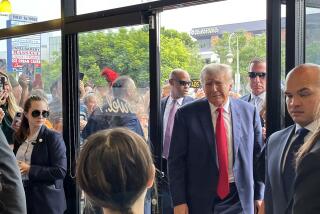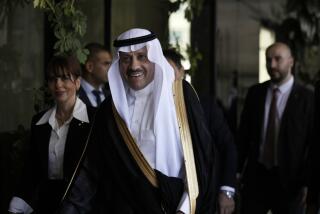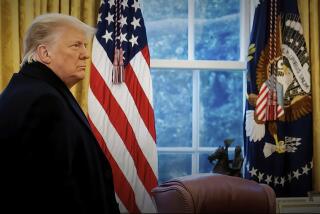As Trump appears to acknowledge Saudi journalist is dead, the U.S. pulls out of Riyadh economic conference
President Trump on Thursday acknowledged the likely death of the missing Saudi journalist at the center of a global crisis, and said those responsible for his killing would suffer “very severe” consequences.
After wavering for days on what happened to Jamal Khashoggi, a Virginia-based Saudi national who wrote opinion columns for the Washington Post, Trump seemed to be moving toward a conclusion that investigators had reached two weeks ago.
His words, and the administration’s first steps toward a limited reprisal against Saudi Arabia, marked a significant shift for the president, who until Thursday had repeatedly given credence to Saudi denials of involvement in Khashoggi’s apparent killing.
But he continued to avoid publicly pinpointing blame.
“It certainly looks that way to me,” Trump said when reporters asked him if Khashoggi was dead. “It’s very sad.”
The consequences “will have to be very severe,” he added. “I mean, it’s bad, bad stuff. But we’ll see what happens.” Trump spoke to reporters at Joint Base Andrews before boarding Air Force One for a flight to a campaign rally in Montana.
Turkish officials have said that Khashoggi, a prominent Saudi journalist who became a critic of the country’s current government, was brutally killed inside the Saudi Consulate in Istanbul. He entered the building on Oct. 2 to obtain official documents and has not been seen since.
Turkish news outlets, which government officials heavily control, have published detailed accounts of what they describe as Khashoggi’s torture and death at the hands of a team of 15 Saudis who flew into Istanbul hours before the killing and left shortly afterward.
The Turkish media have said that those accounts are based on secret audio recordings government officials possess that detail Khashoggi’s death and the dismemberment of his body. The tapes have not been publicly released.
Several of the Saudi men who flew into Istanbul the day Khashoggi disappeared are security officials with close ties to Saudi Arabia’s de facto ruler, Crown Prince Mohammed bin Salman.
A Turkish newspaper on Thursday published a time-stamped photograph of one of them, identified as Maher Abdulaziz Mutreb, entering the consulate a few hours before Khashoggi did. Mutreb has accompanied Mohammed on foreign trips, including one to the United States this year.
The crown prince and his father, King Salman, have denied to Trump that they had any role in the killing. Saudi officials also have publicly insisted that Khashoggi left the consulate alive within a short time of arriving there — a claim that Trump now implicitly acknowledges was false.
People familiar with the thinking of the Saudi rulers expect them to ultimately acknowledge Khashoggi was killed at the consulate and blame overzealous intelligence agents acting on their own initiative. However, the Saudi leadership needs time to identify scapegoats and assure the West they’ve been detained and will be punished, those people said.
Trump has come under mounting criticism from lawmakers, including several prominent Republicans, for failing to condemn the Saudis as he has given the government in Riyadh time to come up with an explanation. Criticism has also come from diplomats and even some corporations that long have profited from close relations with the Saudi royal family.
Earlier this week, Trump compared the accusations against Crown Prince Mohammed to those against his Supreme Court appointee, Justice Brett M. Kavanaugh, saying both were being considered “guilty until proven innocent.”
But in a brief interview with the New York Times on Thursday, he acknowledged that the apparent killing of Khashoggi had set off a foreign policy crisis involving U.S.-Saudi relations.
“This one has caught the imagination of the world, unfortunately,” Trump said, the newspaper reported. “It’s not a positive. Not a positive.”
Earlier in the day, in the administration’s first rebuke of Riyadh, Treasury Secretary Steven T. Mnuchin met with Trump and Secretary of State Michael R. Pompeo and then announced he was pulling out of an upcoming major Saudi investment conference that is a showcase for the crown prince.
Trade and finance ministers from countries including Britain, France and the Netherlands; the head of the International Monetary Fund and CEOs of major companies already had withdrawn in protest. Mnuchin was under growing pressure to add his name to the list.
Fox Business Network also announced it was withdrawing from the conference but was continuing to pursue an interview with the crown prince.
Pompeo told reporters that he had urged the president to give the Saudi government “a few more days” to explain what happened to Khashoggi.
“We ought to give them a few more days to complete that so that we, too, have a complete understanding of the facts,” he said.
Pompeo returned Wednesday night from meetings with leaders in the Saudi and Turkish capitals and went to the White House on Thursday morning to brief Trump.
Pompeo said the Saudis “understand the serious nature” of Khashoggi’s disappearance and would conduct a thorough and “timely” investigation.
Their findings, he said, “will be transparent for everyone to see, to ask questions about, to inquire with respect to its thoroughness.”
Turkey is conducting its own inquiry, and Pompeo said those results will also be taken into consideration. He again stressed the importance of Saudi Arabia as a strategic ally in a relationship, he noted, that dates back more than 80 years.
“We just are going to allow the process to move forward, allow the facts to unfold,” Pompeo said. “And as they unfold, as we make a determination for ourselves about what happened there, based on the facts that are presented to us, the United States will determine what the appropriate response might be.”
Saudi officials appear to hope that an explanation of Khashoggi’s treatment, however implausible, can repair the severe damage done to the government’s reputation and standing in the world.
Prince Mohammed faces a particular challenge in recouping his reputation. He and his supporters have sought to portray him as a reformer, but he has overseen several disastrous Saudi policies in recent years. That list includes a ferocious war in Yemen against Iranian-backed rebels that has killed tens of thousands of civilians and pushed an estimated 13 million people to the brink of famine. Aid officials call Yemen the world’s worst humanitarian crisis.
The oil-rich kingdom is not likely to suffer permanently, however, at least not from Washington, several experts said, because of its continued prominent role in the U.S. security strategy for the region.
Riyadh is a loyal and powerful partner in Washington’s fight against Iran and in the amassing of counter-terrorism intelligence. And although the U.S. is much less dependent on Saudi oil imports than it used to be, the Saudis continue to have the ability to disrupt oil markets and cause considerable economic pain if they choose to do so.
Trump’s son-in-law and senior advisor, Jared Kushner, has invested considerable energy in forging a personal relationship with Prince Mohammed.
Twitter: @TracyKWilkinson
UPDATES:
4:35 p.m.: This article was updated with comments from President Trump and additional reports from Turkey.
9:40 a.m.: This article was updated with Mnuchin withdrawing from the Saudi investment conference.
This article was originally published at 7 a.m.
More to Read
Start your day right
Sign up for Essential California for news, features and recommendations from the L.A. Times and beyond in your inbox six days a week.
You may occasionally receive promotional content from the Los Angeles Times.







